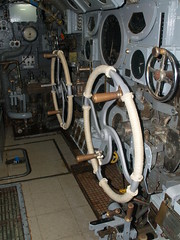
Galveston Texas on Pelican Island Seawolf Park the US Navy Gato class submarine USS Cavalla SS 244 museum 2010 vintage World War II Historic WWII Military ship vessel War Machine
Originally uploaded by mrchriscornwell
And sometimes, in order to understand it, you need to walk away from it.
,,,for a bit…
Anger clouds things…as it should.
Example: My Father died at an early age for me; I was 15. My mother abused us a lot while my father was away working over seas. We'd cry for him to return, and when he finally did, we showered him with praise and never told him of the atrocities that my mother had performed. She'd stopped doing them when he arrived.
It was like we were a whole family again.
When he died, she stopped the con. She never abused us after that.
After that point, I had dreams that he'd come home; and they were deep sleep dreams. When I woke up, I believed that he was there for several hours. In those hours of deception, I have to admit that I enjoyed them. We did things, in that dream state, that I know he wanted to do with me before he died.
When the sobriety of reality slowly set in, I realized that those dream states of my Father were wonderful and a gift. Robert was a great man, and everyone knew and acknowledged it. His death was untimely. He wasn't Ward Cleaver by any stretch, but he was someone I always looked up to.
He taught me math, knife sharpening, car repair, astrology, more math, chemical engineering, poker, plumbing, electrical systems, stereo systems, what not to do to a young lady, how to build an underwater camera housing from scratch, one that doesn't leak at depths (shuttle designers could take a clue from his O-ring design), how to take care of a very drunk sister, how NOT to rewire the house (he didn't like that much when I did that), politics, war, peace.
Robert fought in WWII at 16; he was a sailor. That's where he met my mother, a nurse. They were married and dedicated to each other for more that 30 years before he died. As far as I know, neither has ever been with anyone else their entire lives.
He was an engineer 2nd class in the Navy in WWII. He re-enlisted for the Korean war. He hold sever medals.
Despite his fight against Asians in both wars, he worked with them side-by-side as an oil refinery engineer over seas, and was very fond of their company. Even so, as to bring back many Asian pieced of artwork, some of which we couldn't quite understand (a wood carving of and old man caring a pig on his shoulders?)
But the two greatest things that he ever taught me were:
1. How to look up an answer. I was always asking him stupid questions like: why is the sky blue? Is the Sun a star? (Oh, that got me in trouble with my 1st grade teacher when I told her that the Sun WAS a star. I had to sit in the corner.) He would answer as best he could, but then lead me to the encyclopedias. He taught me how to FIND answers at a very young age.
2. How to be tolerant. I didn't even know, at that young age, that he was teaching me that. I'd always asked him about the war, especially WWII and against the Japs! In a round about way, the softened the subject, then took me to my first Japanese restaurant, where the taught me how to hold, and actually use, chop stick. And I'm not talking about those cheap bamboo Chinese chopsticks; I'm talking pointy, artistic, sharp Japanese chopsticks.
I remember the very polite Japanese waitress in bright red dress taking the time to help me learn how to hold shrimp tempura with just chopsticks; the thumb, index, middle fingers..."too much pressure", "relax, reset the chops". She and him tried over and over again, until I finally got it. All the time, I'm thinking, 'each wants to kill each other', you know, because they fought in the war. But, no; it was tolerance. It was one young Japanese girl trying to teach the next generation (me) their culture from the Father of a man that fought in a war against her ancestors. It was her way of being tolerant, too.
And the meal was awesome.
No comments:
Post a Comment